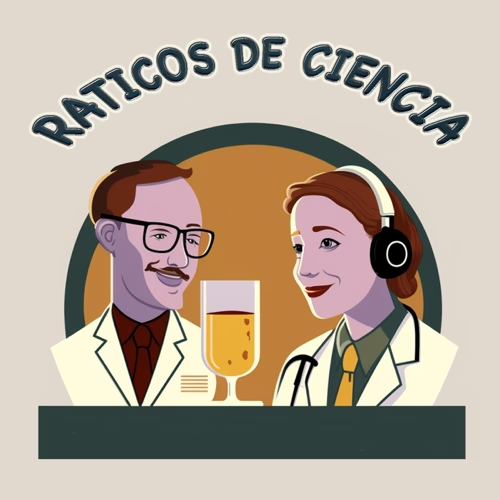
RATICOS DE CIENCIA. Conversaciones con científic@s
[4] EL UNIVERSO NOS HABLA. #MarioHamuy
56 min • 20 mars 2023
TEMAS:
- La vuelta al mundo de Magallanes, y las nubes de Magallanes (galaxias enanas)
- La Astronomía en Chile
- El atractivo de la astronomía para el público
- El espectrógrafo y métodos en astronomía: el Universo nos habla
- “Observar” en un observatorio astronómico
- Supernovas como faros del universo
- El Nobel que pudo ser y no fue
- La expansión del Universo y la energía oscura
- La Supernova de 1987 (primera en 4 siglos)
- La próxima supernova podría verse tan brillante como la luna llena
- El reconocimiento en ciencia
- Hasta Einstein se equivoca
- Las 10.000 galaxias que descubrió el Hubble en un punto negro del espacio
- ¿Estamos solos en el universo?
- ¿Hay hueco para un Dios creador?
- El fin del planeta tierra
*Corrección: El origen de la humanidad ocurrió hace unos 200.000 años, no 200 millones de años
NOTAS:
- Libro: “Bajo la cruz del Sur” (Patricia Cerda). https://www.lavanguardia.com/libros/libro/bajo-la-cruz-del-sur-ebook-9789563607741
- Libro: “Viaje al Big Bang” (Mario Hamuy). ebook en Amazon: https://a.co/d/hcRxtj7
- EL Nobel que tuvo su origen en Chile: https://www.futuro360.com/videos/expansion-del-universo-el-nobel-que-tuvo-su-origen-en-chile_20190122/
- La explosión de las SuperNova de 1987: https://naukas.com/2017/02/24/30-anos-desde-la-explosion-supernova-sn-1987a/
- El asteroide Mario Hamuy: https://www.emol.com/noticias/tecnologia/2011/04/01/473653/bautizan-a-lejano-asteroide-con-el-nombre-de-un-cientifico-chileno.html
- Imágenes el telescopio Webb: https://www.nasa.gov/multimedia/imagegallery/index.html
OTROS LIBROS DE MARIO HAMUY:
• El Sol negro. Editorial Debate, 2019.
• El Universo en Expansión: Del Big Bang al Homo Sapiens (Ciencia y Tecnología) Editorial Debate, 2020,
• Viaje al Big Bang. Editorial Debate, 2022,
TÉRMINOS TÉCNICOS:
- Supernovas: Estrellas que explotan y sirven de indicadores de distancias muy precisos en el Universo
- Agujero Negro: gran concentración de masa que genera un campo gravitatorio tal que ninguna partícula, ni siquiera la luz, puede escapar de él.
- Exoplaneta: planeta que no orbita en torno al Sol, sino alrededor de otras estrellas.
ENLACES A YOUTUBE:
- La Ciencia, hasta la no aplicada, sirve
- https://www.youtube.com/watch?v=0j3oEufjvrE
- EL “ROBO” DEL NOBEL:
- https://www.youtube.com/watch?v=pAOChbFhVsA
- Presentación del libro “Viajé al Big Bang”
- https://www.youtube.com/watch?v=353AK-iXkkE
Barrio de Providencia, Santiago de Chile
SOBRE MARIO HAMUY:
- Mario Hamuy en Wikipedia: https://es.wikipedia.org/wiki/Mario_Hamuy_Wackenhut
Mario A. Hamuy. CV EnglisH.
President Fundación Chilena de Astronomía
Education
• Ph.D. Astronomy: The University of Arizona (2001)
• M.S. Physics: Universidad de Chile (1984)
• B.S. Physics: Universidad de Chile (1982
Positions Held
• 2019-2021 Vice-President of AURA and Director of AURA Observatory in Chile, Santiago, Chile
• 2019-2021 Vice-President of Chilean Academy of Sciences, Santiago, Chile
• 2011-2019 Full Professor, Astronomy Department, University of Chile, Santiago, Chile
• 2014-2019 Associate Investigator of Millennium Institute of Astrophysics, Santiago, Chile
• 2016-2018 Chairman of the Board of CONICYT, Santiago, Chile
• 2016-2018 Scientific Advisor to the President of Chile, Santiago, Chile
• 2014-2016 Director of Millennium Institute of Astrophysics (MAS), Santiago, Chile
• 2007-2014 Director of Millennium Center for Supernova Science (MCSS), Santiago, Chile
• 2004-2011 Associate Professor, Astronomy Department, University of Chile, Santiago, Chile
• 2003-2005 Post-doctoral Fellow, Las Campanas Observatory, Carnegie Observatories, La Serena, Chile
• 2001-2003 Post-doctoral Fellow, Carnegie Observatories, Pasadena, CA, USA
• 2000-2001 Teaching Assistant for Prof. A. Zabludoff, The University of Arizona, AZ, USA
• 1998-2000 Research Assistant for Prof. P. A. Pinto, The University of Arizona, AZ, USA
• 1987-1995 Research Assistant and data-reduction specialist at Cerro Tololo Inter-American Observatory, La Serena, Chile
• 1985-1986 Research Assistant at the Department of Astronomy of the University of Chile
• 1985-1986 Part-time observer at the University of Toronto 24" telescope at Las Campanas Observatory, Chile
Awards
• 2020: Llaves de la Ciudad e Hijo Ilustre de Vallenar
• 2019-2023: Faculty Fellow Hagler Institute for Advanced Study of the Texas A&M University
• 2019: Honorary Member of the American Astronomical Society
• 2016: The World Academy of Sciences Prize in Earth, Astronomy and Space Sciences
• 2015: Premio Nacional de Ciencias Exactas de Chile
• 2011-2012: John Simon Guggenheim Fellowship
• 2004-2005: Carnegie Observatories Fellowship
• 2001-2004: Hubble STScI/NASA Fellowship HST-HF-01139.01-A
• 1997-1998: Gemini NSF/AURA Fellowship GF-1002-97
• 1996-1997: Gemini NSF/AURA Fellowship GF-1002-96
• 1995-1996: Gemini NSF/AURA Fellowship GF-1002-95
Grants as PI
• 2013-2022: Iniciativa Científica Milenio "Millennium Institute of Astrophysics"
• 2007-2014: Iniciativa Científica Milenio "Millennium Center for Supernova Studies"
• 2007-2009: National Science Foundation project 0306969 "Measuring the Universe with Supernovae"
• 2006-2009: Conicyt-CHILE Fondecyt project 1060808 "A study of core-collapse supernovae in the local Universe"
• 2003-2005: National Science Foundation project 0306969 "Measuring the Universe with Supernovae"
• 1992-1995: Conicyt-CHILE Fondecyt project 92-0312 "Search for Supernovae"
• 1990-1991: Conicyt-CHILE Fondecyt project 90-727 "The light curve of SN 1987A"
Teaching Experience
• Fall 2006: University of Chile. Professor for the course AS42A "Astrofisica de Galaxias"
• Fall 2006: University of Chile. Professor for the course AS49A "Practica de Vacaciones"
• Fall 2005: University of Chile. Professor for the course AS49A "Practica de Vacaciones"
• 2000: University of Arizona. TA for the course NATS102 "The Physical Universe" (Various Professors)
• 2000: University of Arizona. TA for the course ASTR204 "Great Debates in Astronomy" (Prof. A. Zabludoff)
• 1982: University of Chile. TA for the course "Introduction to Physics" (Prof. F. Brieva)
• 1981: University of Chile. TA for the course "Electricity and Magnetism" (Prof. F. Brieva)
• 1979-1982: University of Chile. TA for the course "Linear Algebra" (Prof. R. Baez)
Research Experience
• Globular clusters and stellar populations
• Novae
• Supernovae
• GRBs
• Transients
• Galaxies and stellar synthesis
• Active galaxies
• Cosmology
• Standard stars: Photometric and spectrophotometric calibrations
• Big Data astronomy
Professional Societies
• American Astronomical Society
• International Astronomical Union
Corporations and Foundations
• President of "Fundación Chilena de Astronomía"
• Board Member of "Corporación para la Investigación de la Paleontología e Historia Natural de Atacama"
Senaste avsnitt
00:00
-00:00